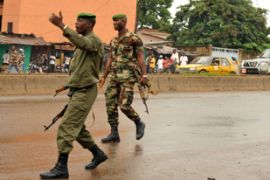Guinea set for first free vote
West African nation to elect president on Sunday after decades of military rule.

Campaigning has been vigorous, with posters plastered on walls and candidates holding boisterous rallies in the streets.
Positive sign
“A compressed timetable for the elections has generated some irregularities and some technical challenges,” Human Rights Watch said in a statement on Friday.
“But the defence ministry’s promise to keep the military in barracks during the election period, and to back whoever wins is a very positive sign,” it said.
| IN DEPTH |
|
|
|
|
The top contenders are thought to be Cellou Dalein Diallo and Sidya Toure, two ex-premiers, and Alpha Conde, a longtime government opponent.
More than 4.2 million Guineans have registered to vote, including more than 112,000 in 17 foreign countries in Africa, Europe and the United States.
The west African nation gained independence from France in 1958 and has since been ruled by a succession of civilian and military dictators.
Guinea is a country “rich in minerals yet riddled with poverty,” our correspondent said.
It is the world’s top bauxite producer, a mineral needed to produce aluminum, and also holds significant deposits of diamonds, gold and iron ore.
Carnage
The military government of Moussa ‘Dadis’ Camara gained international notoriety in September 2009 after army units opened fire on pro-democracy demonstrators gathered in a Conakry stadium.
Security forces massacred more than 150 people, wounded 1,000 others and raped some 100 women.
That carnage acted as a turning point in the country’s turbulent history.
In December 2009, Camara was shot by an aide. He survived but was forced into exile as part of a tenuous peace deal.
General Sekouba Konate, Camara’s deputy, appointed a civilian prime minister and established a civilian-led transitional governing council, paving the way for a new constitution and Sunday’s elections.
Rabiatou Serah Diallo, a former union leader, called Sunday’s election a “decisive moment”.
“This is a new beginning,” she said.
“What we do in the future is what’s important. There’s much to do, and it’s not going to be easy.”

